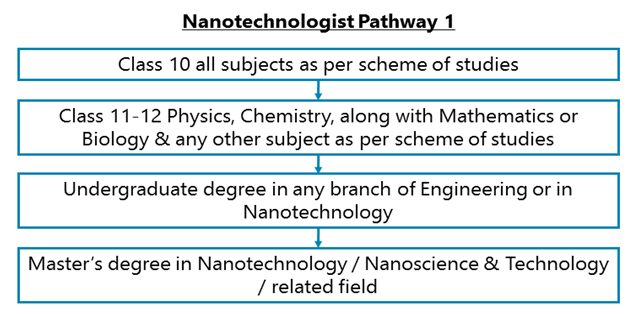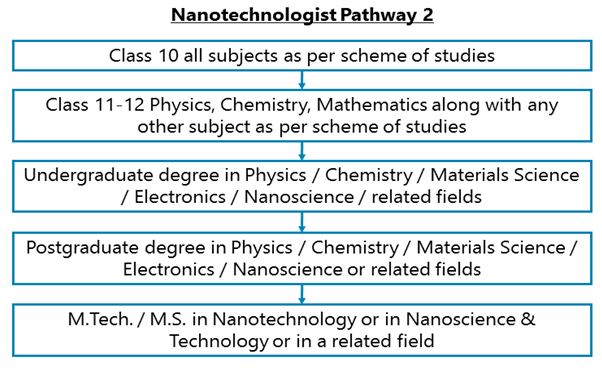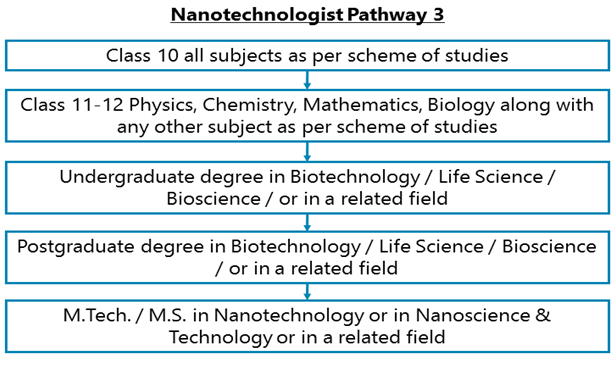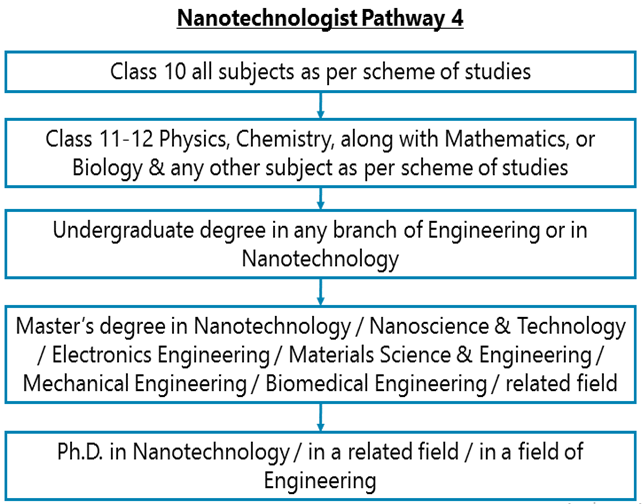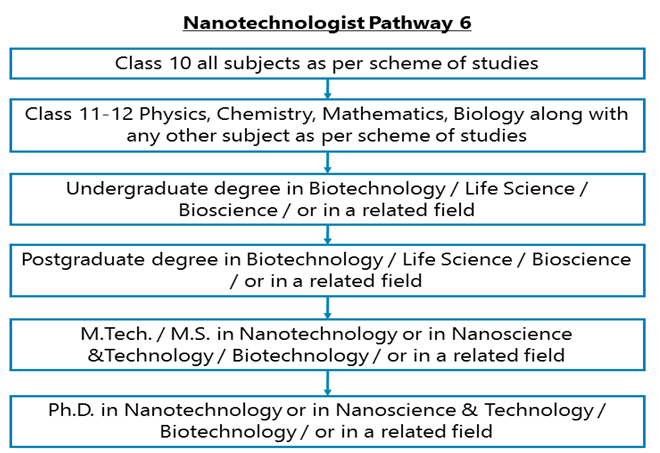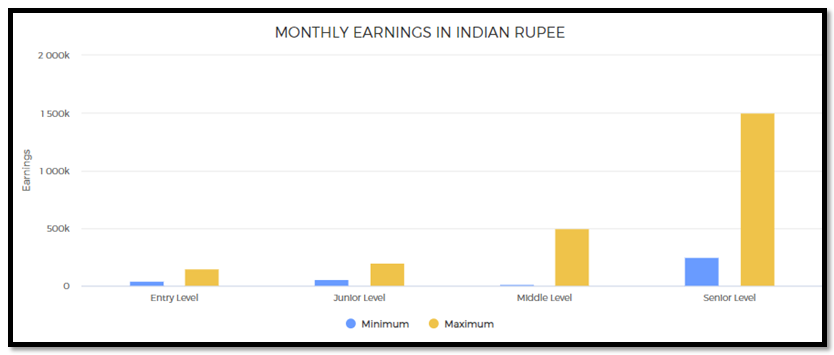Nanotechnologist
Entry Level Qualification
12
Career Fields
Engineering & Technology
For Specially Abled







Career Entrance Exam
About Career
PARTICULARS | DESCRIPTION |
Name | Nanotechnologist |
Purpose | Design, synthesize, and characterize materials |
Career Field | Engineering & Technology |
Required Entrance Exam | No Entrance Exam |
Average Salary | 5,00,000 - 15,00,000 Rs. Per Year |
Companies For You | Adnano Technologies, Mittal Enterprises, NanoSniff Technologies & Many More |
Who is Eligible | Class 12th Pass |
Nanotechnology is a futuristic field which will give us incredible applications in our professional and personal life the future. Right from nano robots which could go inside a human organ to repair a diseased part and nanoparticles which can let us have wearable computers to spacecraft using much less fuel to propel to space – Nanotech will be applied in many fields.
Nanotechnology deals with materials, devices, or other structures, a single unit of which is sized between 1 to 1000 nanometers (in length, breadth, or height, or in more than one dimension). However, in most cases nanomaterials fit in nanoscale, that is within 1 to 100 nanometers.
What is a nanometer by the way? A nanometer is one billionth of a meter. Means it is 1/1,000,000,000 or 0.000000001 meter.
At this size, the physical and chemical properties of materials vary widely compared to their larger counterparts. For example, nano-aluminium (Al) powder (grey or black in color typically ranging in size from 10 nm to 5micrometer) is far more effective as a catalyst than metallic Al.
Nanotechnologists discover, research, develop, manufacture and use nanomaterials, various types of nanoscale devices and systems which find applicationsin several fields - ranging from agriculture, healthcare (pharmaceuticals, medical technology, diagnostic devices etc.), and environmental sustainability toaerospace technologies, energy (conversion, storage and saving), and consumer electronics.
To develop various types of nanomaterials, nanoscale devices and systems, Nanotechnologists modify and change materials in atomic and molecular level. They design devices which can use nanomaterials or devices, the dimensions of which are in nanoscale.
Example of nanomaterials - Carbon Nanotubes
Carbon nanotubes are made of carbon molecules, the diameters of which are measured in nanoscale. Carbon nanotubes havea very high degree of thermal and electrical conductivity and they have very high tensile strength. In simple words, carbon nanotubes are super strong and super flexible. They can conduct heat and electricity more efficiently than a copper wire.
Carbon nanotubes are being used in many products nowadays or have potentials to be used – such as dental implants (which are far stronger), aircraft structures (to make lighter but stronger aircraft and spacecraft to save fuel for flying them), smaller microprocessor (used in computers and electronic products), and so on. Smaller microprocessors will give you smaller and thinner computing devices which you can even wear.
Example of nanomaterials – LED displays
You could be already using LED screens in your mobile phones or in computers. Nanoparticles are being used nowadays in some high-tech LED displays for higher brightness and color variability (for those who have studied their Physics well, LEDs are light emitting diodes). These nanoparticles are typically the nanoform of semiconductor metal oxides such as zinc oxide (ZnO). The nanoform is more effective than the solid crystalline form of these metal oxides.
Example of nanotechnology in cancer treatment
Nanoparticles are being developed now to deliver drugs directly to cells which are affected by cancer. So instead of chemotherapy or radiotherapy which affects healthy cells as well surrounding the cancerous cells, nanoparticles delivered drugs affect the cancerous cells only. So, this will improve the cancer treatment quite dramatically reducing various side effects of chemotherapy and radiotherapy.
Functional Fields of Work
As a Nanotechnologist, you will be involved in any one of the following broad functional domains and will assume responsibilities accordingly:
1. Fundamental (Academic) Research
This is essentially laboratory basedresearch without any particular application or product in mind. There will be planned outcomes though.However, no specific industry sector or market niche is targeted.
For an example, research on ‘Quantum Dots’ (metal oxide based nanoparticles with the properties of a semiconductor) can be applied to a vast range of display products like mobile phones, satellite television etc. or maybe display systems in space research or astrophysical intergalactic flying units.
2. Research and Development (R&D)
This is also laboratory research but application based and driven by the need of a customer or government. It is generally targeted at a specific sector of a certain industry and its end users.For an example, research of development of a drug named ‘Doxil’ which is the first FDA (Food & Drug Administration of the USA)approved nano-drug used in cancer therapy. Nano particulates are readily absorbed in cancerous tumors as unlike healthy normal tissue they are rich in porous blood capillaries that are permeable to particles sized 100 nm or smaller.
3. Translational Development
Translational Development involves research to bring a product out of the lab to a commercial scale and subsequently deliver to the intended end users (who or what ultimately uses a product) or beneficiaries.
For example, a nanoparticulate nanomedicine (NNM-a specific type of drug) discovered and developed in a laboratory has to undergo a lots of clinical tests before it can be used for humans and also a lot of processes are required to be developed to produce the medicine in commercial scale (that is, in a large quantity for consumers). This is called translational research.
4. Production and manufacturing / Quality Control
When a discovered product has passed all stages of translational development and has been approved for commercialization / marketing by the concerned authorities, then it is manufactured in factories or industrial units.
Let us consider another example, Nano packaging for preservation of fresh strawberry. In this case, the fruits are preserved with a packing materialwhich is a mixture of polyethylene and nano-powder of silver and titanium dioxide (TiO2). You will have to check whether the packing material actually works with real fruits. You will also have to analyze how stableit is by testing it for a long duration and how it will assist commercial producers and retailers in future.
5. Education
Education involves roles of an academician in colleges and universities teaching Nanotechnology or related subjects. Typically, in universities, all educators are involved in research too – both fundamental and basic research as well as applied research. For example, they may work to discover or develop a nanomaterial for various applications, or they may develop a nanotech solution to solve an industrial problem.
Key Roles and Responsibilities
As a Nanotechnologist depending on your functional field of work, you will be engaged with one or moreof the following roles and responsibilities: -
For Research
1. You will be involved in conducting research regarding new technologies, experimental techniques, instruments and laboratory supplies that can improve research standards as well as operating procedures and outcomes.
2. You will be mixing raw materials or catalysts for manufacturing nanoparticles following specifications, ensuring proper shape, particle size, or organization.
3. You will be analyzing large molecular datasets for research purposes.
4. You will be comparing the performance of nanoparticles by their size, shape, or organization and analyze their life cycles to determine their environmental impact.
5. You will be using tools, technologiesto produce images or measurements with help of a variety of specialized laboratory techniques and equipment like microscopes, cell sorters etc.
6. You will be collaborating with engineers or scientists to design or conduct experiments for the development of nanotechnology materials, devices, components, or systems.
7. You will be developing industrial scale processes for lab scale models of various research projects.
8. You will be preparing detailed written or verbal presentations, technical reports and compilations based upon research outcomes for engineers, scientists, or upper management.
9. You will be contributing written material or data for publication, grant or patent applications.
For Production and Manufacturing / Quality Control
1. You will be analyzing production, quality control, maintenance, or other operational reports, developing or implementing production tracking to detect production problems.
2. You will be setting and monitoring product standards, examining samples of raw products or directing testing during processing, to ensure finished products are of prescribed quality.
3. You will be coordinating or recommending procedures for equipment, process or facility modificationormaintenance, including the replacement of machines, techniques or technology.
4. You will be reviewing plans and conferring with research or technical laboratory staff to develop new products or processes.
5. You will be proposing new products, processes, technologies or applications based on findings from applied research projects.
6. You will be maintaining current knowledge of the quality control field, researching on current literature related to technological advances, materials use, or statistical studies.
For Education
1. You will be involved in teaching/demonstrating to a class of students or a team of research scholars pursuing this stream of study.
2. You will typically be engaged in supervising or outlining research projects for doctoral or post-doctoral scholars working in your team.
3. You will demonstrate techniques or handling of apparatuses to your students inside a laboratory and counsel / guide students in performance of laboratory course experiments.
4. You will participate in seminars, science congresses, conferences across the world.
5. You will be involved in conducting regular research regarding new technologies, experimental techniques, instruments and laboratory supplies that can improve research standards as well as operating procedures and outcomes.
Career Entry Pathway
Class 10 all subjects as per scheme of studies – Class 11-12 Physics, Chemistry, along with Mathematics or Biology & any other subject as per scheme of studies – Undergraduate degree in any branch of Engineering or in Nanotechnology – Master’s degree in Nanotechnology / Nanoscience & Technology / related field
After your senior secondary or higher secondary examination of Class 11-12 with Physics, Chemistry, along with Mathematics or Biology any other subject as per scheme of studies, you can first do an undergraduate degree in any branch of Engineering, specially in Electronics, Biological, Biochemical, Biotechnology, Biomedical, Electrical, Chemical, Civil, Mechanical, Mechatronics, Polymer Engineering, Pharmaceutical Technology, or Materials Science & Engineering or you can do an undergraduate program in Nanotechnology. After your undergraduate degree, you can do an M.Tech. or an equivalent degree in Nanotechnology or Nanoscience & Technology or in a related field to get an opportunity to work in Nanotechnology. Remember that you will need to study Physics, Chemistry, Mathematics, and Biology in you higher / senior secondary level only if you want to study for an undergraduate degree in Bioengineering / Biotechnology / Biochemical / Biomedical / any other field of Biological Engineering.
Class 10 all subjects as per scheme of studies – Class 11-12 Physics, Chemistry, Mathematics along with any other subject as per scheme of studies – Undergraduate degree in Physics / Chemistry / Materials Science / Electronics / Nanoscience / related fields – Postgraduate degree in Physics / Chemistry / Materials Science / Electronics / Nanoscience or related fields – M.Tech. / M.S. in Nanotechnology or in Nanoscience & Technology or in a related field
After your senior secondary or higher secondary examination in Class 11-12 Physics, Chemistry, Mathematics along with any other subject as per scheme of studies, you can first do an undergraduate degree followed by a postgraduate degree in Physics / Chemistry / Materials Science / Electronics / Nanoscience or in a related field. Then you can do an M.Tech. or M.S. or an equivalent degree in Nanotechnology or in Nanoscience and Technologyor in a related field to get an opportunity to work in Nanotechnology.
Class 10 all subjects as per scheme of studies – Class 11-12 Physics, Chemistry, Mathematics, Biology along with any other subject as per scheme of studies – Undergraduate degree in Biotechnology / Life Science / Bioscience / or in a related field – Postgraduate degree in Biotechnology / Life Science / Bioscience / or in a related field – M.Tech. / M.S. in Nanotechnology or in Nanoscience & Technology or in a related field
After your senior secondary or higher secondary examination in Class 11-12 Physics, Chemistry, Mathematics & Biology along with any other subject as per scheme of studies, you can first do an undergraduate degree followed by a postgraduate degree in Biotechnology / Life Science / Bioscience / Biophysics / Biochemistry / Microbiology / Molecular Biology / or in a related field. Then you can do an M.Tech. or M.S. or an equivalent degree in Nanotechnology or in Nanoscience & Technology or in a related field to get an opportunity to work in Nanotechnology. Remember that for doing an M.Tech. in Nanotechnology, you must have studied Mathematics in your senior/ higher secondary level.
Class 10 all subjects as per scheme of studies – Class 11-12 Physics, Chemistry, along with Mathematics, or Biology & any other subject as per scheme of studies – Undergraduate degree in any branch of Engineering or in Nanotechnology – Master’s degree in Nanotechnology / Nanoscience & Technology / Electronics Engineering / Materials Science & Engineering / Mechanical Engineering / Biomedical Engineering / related field – Ph.D. in Nanotechnology / in a related field / in a field of Engineering
After your senior secondary or higher secondary examination in Class 11-12 Physics, Chemistry, along with Mathematics, or Biology & any other subject as per scheme of studies, you can first do an undergraduate degree in any branch of Engineering, especially in Electronics, Biological, Biochemical, Biotechnology, Biomedical, Electrical, Chemical, Civil, Mechanical, Mechatronics, Polymer Engineering, Pharmaceutical Technology, or Materials Science & Engineering or you can do an undergraduate program in Nanotechnology. After your undergraduate degree, you can do an M.Tech. or an equivalent degree in Nanotechnology, Nanoscience & Technology, Electronics, Biological, Biochemical, Biotechnology, Biomedical, Electrical, Chemical, Mechanical, Mechatronics, Polymer Engineering, Pharmaceutical Technology, or Materials Science & Engineering or in a related field. You can then do a Ph.D. in Nanotechnology / in a branch of Engineering such as Electronics, Biological, Biochemical, Biotechnology, Biomedical, Electrical, Chemical, Mechanical, Mechatronics, Polymer Engineering, or in Materials Science to get a good career opportunity. Remember that you will need to study Physics, Chemistry, Mathematics, and Biology in you higher / senior secondary level only if you want to study for an undergraduate degree in Bioengineering / Biotechnology / Biochemical / Biomedical / any other field of Biological Engineering.
Class 10 all subjects as per scheme of studies – Class 11-12 Physics, Chemistry, Mathematics, along with any other subject as per scheme of studies – Undergraduate degree in Physics / Chemistry / Materials Science / Electronics / Nanoscience / related fields – Postgraduate degree in Physics / Chemistry / Materials Science / Electronics / Nanoscience or related fields – M.Tech. / M.S. in Nanotechnology or in Nanoscience & Technology / Materials Science / or in a related field – Ph.D. in Nanotechnology / Materials Science / in a related field
After your senior secondary or higher secondary examination in Class 11-12 Physics, Chemistry, Mathematics, along with any other subject as per scheme of studies, you can first do an undergraduate degree followed by a postgraduate degree in Physics / Chemistry / Materials Science / Electronics / Nanoscience or in a related field. Then you can do an M.Tech. or M.S. or an equivalent degree in Nanotechnology or in Nanoscience and Technology or in Materials Science or in a related field. After your M.S./ M.Tech., you can do a Ph.D. in Nanotechnology / Nanoscience & Nanotechnology / Materials Science / in a related field.
Class 10 all subjects as per scheme of studies – Class 11-12 Physics, Chemistry, Mathematics, Biology along with any other subject as per scheme of studies – Undergraduate degree in Biotechnology / Life Science / Bioscience / or in a related field – Postgraduate degree in Biotechnology / Life Science / Bioscience / or in a related field – M.Tech. / M.S. in Nanotechnology or in Nanoscience &Technology / Biotechnology / or in a related field – Ph.D. in Nanotechnology or in Nanoscience & Technology / Biotechnology / or in a related field
After your senior secondary or higher secondary examination in Class 11-12 Physics, Chemistry, Mathematics, Biology along with any other subject as per scheme of studies, you can first do an undergraduate degree followed by a postgraduate degree in Biotechnology / Life Science / Bioscience / Biophysics / Biochemistry / Microbiology / Molecular Biology / or in a related field. Then you can do an M.Tech. / M.S. in Nanotechnology or in Nanoscience & Technology / Biotechnology / or in a related field to get an opportunity to work in Nanotechnology. After your M.Tech. / M.S., you can do a Ph.D. in Nanotechnology / Nanoscience & Nanotechnology / Biotechnology / in a related field. Remember that for doing an M.Tech. in Nanotechnology, you must have studied Mathematics in your senior/ higher secondary level.
Required Qualification & Competencies
After your Class 11-12 Physics, Chemistry, and Mathematics or with Physics, Chemistry, Mathematics, and Biology (for all Biological Engineering fields and all Bioscience fields) along with any other subject as per scheme of studies, you can study for an undergraduate degree in a field of Engineering / Physical Science/ Bioscience / Biotechnology. Then you can do a Master’s degree. If you do a Master’s degree in Physical or Bioscience, then you should do an M.Tech. and M.S. degree. Then you may either opt for a job opportunity or do a Ph.D.
You can study for a Bachelor’s / Master’s / Doctoral degree in any of the following fields (Note that all these fields may not offer you a degree at all three levels, that is in Bachelor’s, Master’s and Doctoral. Some fields may offer a degree only at the Master’s or at the Doctoral level):
1. Agricultural Biotechnology (Engineering)
2. Bio Nanotechnology
3. Biochemistry & Molecular Biology
4. Bioelectrical Engineering
5. Bioelectronics Engineering
6. Bioengineering
7. Biology
8. Biomechanical Engineering
9. Biomedical Engineering
10. Biophysics
11. Biosciences
12. Biotechnology
13. Cellular and Molecular Biology
14. Chemical & Materials Engineering
15. Chemical and Bioengineering
16. Chemical and Metallurgical Engineering
17. Chemical and Pharmaceuticals Technologies
18. Chemical Engineering
19. Chemistry
20. Electrical and Computer Engineering
21. Electrical Engineering
22. Electronics
23. Electronics & Communication Engineering
24. Electronics and Biomedical Engineering
25. Electronics and Computer Engineering
26. Electronics Engineering
27. Life Science
28. Material Physics
29. Materials Science and Engineering
30. Mechanical Engineering
31. Mechatronics Engineering
32. Metallurgical Engineering
33. Microbiology
34. Molecular Biology
35. Nano Biology
36. Nano Engineering and Nanotechnologies
37. Nanoscience
38. Petrochemical Engineering
39. Petroleum and Petrochemical Engineering
40. Pharmaceutical Biotechnology (Engineering)
41. Pharmaceutical Technology
42. Pharmaceutics & Pharmaceutical Engineering
43. Physics
44. Plastic Engineering & Technologies
45. Polymer Chemistry
46. Polymer Engineering
Nanotechnology can find its applications in numerous fields and is applied to almost all branches of science and engineering today. This is a highly cross-disciplinary field and any Scientist or Engineer can by virtue of her work experience contribute as a Nanotechnologist.
MINIMUM EDUCATION REQUIRED | MAXIMUM EDUCATION REQUIRED |
Post Graduate | Post-Doctoral |
COMPETENCIES REQUIRED
1. You should have interests for Investigative Occupations. Investigative occupations involve working with ideas and quite a lot of thinking, often abstract or conceptual thinking. These involve learning about facts and figures; involve use of data analysis, assessment of situations, decision making and problem solving.
2. You should have interests for Realistic Occupations. Realistic occupations involve more practical and hands-on activities than paperwork or office work. Realistic occupations often involve physical activities for getting things done using various tools and equipment.
3. You should have interests for Enterprising Occupations. You should have interests for Enterprising Occupations. Enterprising occupations involve taking initiatives, initiating actions, and planning to achieve goals, often business goals. These involve gathering resources and leading people to get things done. These require decision making, risk taking and action orientation.
4. You may need knowledge of Physical Science - Knowledge of physical principles, laws, their interrelationships, and applications to understand fluid, material, earth, ocean, atmosphere, and space dynamics, as well as mechanical, electrical, atomic and sub- atomic structures, properties and processes.
5. You may need knowledge of Chemical Science - Knowledge of the chemical composition, structure, and properties of substances and of the chemical processes and transformations that they undergo. This includes uses of chemicals and their interactions, toxicity, production techniques, and disposal methods.
6. You may need knowledge of Biological Sciences - Knowledge of plants and animals, their anatomical structure, cell structure, tissues, physiological functions, evolution, and all other related aspects.
7. You may need knowledge of Electrical and Electronics - Knowledge of circuit boards, processors, chips, electronic system design, electronic equipment, electrical equipment and appliances, electrical power generation, etc.
8. You should have knowledge of Computers–for using computers for various technical and academic purposes.
9. You should have Critical Thinking skills- Skills in the analysis of complex situations, using logic and reasoning to understand the situations and take appropriate actions or make interpretations and inferences.
10. You should have Reading Comprehension Skills - Skills in understanding written sentences and paragraphs in work related documents.
11. You should have Judgment and Decision Making Skills - considering pros and cons of various decision alternatives; considering costs and benefits; taking appropriate and suitable decisions.
12. You should have Problem Solving Skills - Skills in analysis and understanding of problems, evaluating various options to solve the problems and using the best option to solve the problems.
13. You should have Oral Comprehension Ability - listen to and understand information and ideas presented through spoken words and sentences.
14. You should have Oral Expression Ability - communicate information and ideas in speaking so others will understand.
15. You should have Deductive Reasoning Ability - apply general rules and common logic to specific problems to produce answers that are logical and make sense. For example, understanding the reasons behind an event or a situation using general rules and common logic.
16. You should have Problem Sensitivity - The ability to tell when something is wrong or is likely to go wrong. It does not involve solving the problem, only recognizing there is a problem.
17. You should have Inductive Reasoning Ability - The ability to combine pieces of information from various sources, concepts, and theories to form general rules or conclusions. For example, analyzing various events or situations to come out with a set of rules or conclusions.
18. You should have Near Vision - The ability to see details at close range (within a few feet of the observer).
19. You are always or mostly careful about your actions and behaviour.
20. You are always or mostly disciplined in your action and behaviour.
21. You are always calm or generally remain calm in most situations.
22. You can always act independently or could do so in most situations.
23. You always prefer to experience newthings and have new experiences, or you mostly do.
Career - Job Opportunities & Profiles
You may be involved in research based roles working in a laboratory (Fundamental/Academic research, R&D, Translational Development).
Various company/trust/organization/academy may also sponsor your laboratory based research in an educational institution where you will be working as an Enterprise Fellow. You will be on official payroll of the company/trust/organization/academy however and not the educational institution. The grant is given only to innovative, creative entrepreneurial engineers who may be researchers, recent graduates, or international PhD students, wishing to spin out a company or start up. These companies are recognized as ‘spin-offs’. For an example, NanoSniff is a commercial spin-off from the Center of Excellence in Nanoelectronics (CEN) at IIT Bombay.
You can find work pharmaceutical/therapeutics companies or allied companies, healthcare research-based companies, nuclear engineering/science laboratories, biotechnology companies, electronics and electrical devices manufacturing companies, optometric device manufacturing companies, power/energy industry etc. as:
1. Assistant Engineer (Nanotech)
2. Research and Development Engineer (Nanotech)
3. Research Scientist
4. Program Specialist
5. Product Research Engineer
6. Research Associate
7. Manufacturing Design Engineer (Nanotech)
8. Product Compliance Engineer
9. Assistant Project Scientist – Nano Engineering
10. Process Engineer Entry Level
11. Instrumentation Specialist
12. Energy Storage Technology Engineer
Some of the leading companies include (India): Adnano Technologies, Mittal Enterprises, NanoSniff Technologies, Sisco Research Laboratories (SRL), Auto Fibre Craft 6. Bilcare, Eris Technologies, Kerala Minerals & Metals (KMML), NanoXpert Technologies, Navran Advanced Nanoproducts Development, etc.
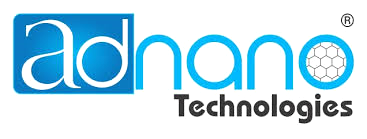



Global: Nanocyl S.A. (Belgium), NanoMaterials Ltd. (Israel), Nanosys, Inc. (USA), Advanced Nano Products Co., Limited (South Korea), Altair Nanotechnologies Inc. (USA), Advanced Diamond Technologies, Inc. (USA), QuantumSphere, Inc. (USA), Bruker Corporation (USA), Catalytic Materials, LLC (USA), Chemat Technology Inc. (USA), ELITech Group (France), Hanwha Chemical Corporation (South Korea), Hybrid Plastics Inc. (USA), Hyperion Catalysis International, Inc. (USA), Rogue Valley Microdevices, Inc. (USA), Starpharma Holdings (Australia), etc.
SPECIALISATION TRACKS IN THIS CAREER
1. Nanotechnologist (Nanobiotechnology / Nanobiology)
It involves the application of nanotechnology in the many avenues of life sciences domain such as medicine (like intelligent drug delivery), agriculture etc. A significant number of promising medical projects are in an advanced experimental stage currently. A Nano-biotechnologist is primarily involved in applying information technology & nanotechnology into contemporary biological issues. For example, nano gold particles affixed with short segments of DNA are being increasingly used for gene sequencing and assays.
2. Nanotechnologist (Nanomaterials and Nanoparticles)
Many conventional materials when formed from nanoparticles, their properties change. This is typically a result of greater surface area per weight that nanoparticles have compared to larger particles which cause them to be more reactive to some other molecules. Nanotechnologists working with Nanomaterials and Nanoparticlesmay belong to a wide range of industries like pharmaceuticals, packaging, manufacturing, energy, electronics, etc. For example, polyethylene and nanocrystals of silver and titanium dioxide (TiO2) help in preserving the quality of fresh Chinese jujube (buckthorn) at room temperature. Fruit softening, weight loss, browning, etc. are all inhibited.
3. Nanotechnologist (Nanophysics and Nanophotonics)
This branch has a multitude of potentials to achieve breakthroughs in biology and materials science. It involves studying a variety of specimens from glass structures to living cells. This deals with controlling physical and optical processes at nanometer length scales. For example, nanoparticles are used for high brightness and color variability in displays these days used for mobile phones, televisions, monitors, etc. These nanoparticles typically are the nano-form of metal oxides such as zinc oxide (ZnO). The nano-form is more effective than the solid crystalline form of these metal oxides. These metal oxide based nanoparticles are technically known as ‘Quantum Dots’.
4. Nanotechnologist (Micro and Nanofluidic devices)
This involves the study of the behavior, manipulation, and control of fluids that are confined to structures of nanometer characteristic dimensions (typically 1-100 nm where 1 nm=0.000000001 m) and such physical behaviors are not observed in larger structures even in micrometer scale. For example, to study single cells or DNA molecules, necessary devices are needed to be integrated on a single chip. This led to the discovery of miniaturized chip-based nano-fluidic channels for direct visualization of single DNA molecules. These nanoscale devices could reach a single cell / DNA molecule to help researchers study them.
5. Nanotechnologist (Nanoelectronics)
Nanoelectronics covers a diverse set of devices and materials like processing and memory chips or optoelectronic (optical display units like televisions, camera screens, monitors, etc.) devices. It is used for constructing faster computing systems and developing new technologies to reduce energy consumption. For an example, graphene which is single layer ‘almost 2D’ (considering nothing in this world that we can see is 2D, all are 3D even those that appear to be very fine or thin) graphite can be formed into nano-ribbon like structures and used in electronic chips and circuits. Graphene-based nanoelectronics is extremely popular these days.
6. Nanotechnologist (Medicinal and Nano-biochemistry)
This primarily deals with developing personalized and efficient disease treatment therapies with lower side effects typically through smart ‘nanodevices’ which narrowly target the disease site. This branch closely works together with medicinal chemistry as drug molecules are essentially chemical compounds either synthetic or natural. The term of interest here should be ‘nanomedicines’ or specifically ‘nanoparticulate nanomedicines’ (NMMs). For an example, ‘Doxil (Registered Trademark)’ is the first FDA approved nano-drug used in cancer therapy. Nano particulates are readily absorbed in cancerous tumors as, unlike healthy normal tissue, they are rich in porous blood capillaries that are permeable to particles sized 100 nm or smaller.
CAREER GROWTH
You may grow though the following roles depending on your functional field of work.
Academic Research / R&D / Translational development:
Postdoctoral Research Specialist, Senior Scientist/Engineer, Senior Facilities Engineer, Project Supervisor, Principal Scientist, Research Investigator, Principal System Design Engineer, Senior Principal Research Scientist, Manager-Applications Development Engineering, Head of Technical/R&D, Director-Technical Programs
Production & Manufacturing / Quality Control:
Technical Communications Specialist, Senior QA Associate, Biosecurity Officer, Safety Auditor, Supplier Quality Specialist, Raw Material & Stability Leader, Sustainable Materials Manager, Director-Project Management, Senior Director / Head of Engineering
Education:
Industrial Fellow, Associate Lecturer, Lecturer (Level B), Lecturer (Level C), Senior Lecturer/Associate Professor, Emeritus Professor, Visiting Senior Research Fellow, Honorary Senior Research Fellow, Director of Department.
Salary Offered
1. At the entry level jobs, after your Master’s degree in Engineering/Technology depending upon the institution where you are graduating from, you may expect to get about Rs. 40,000 – 1,50,000 or even more a month. In junior level jobs (after 4-5 years of experience), you can make about Rs. 60,000 – 2,00,000 or more per month.
2. In mid-level jobs in India (after having 8-10 years of experience), you can expect to earn about Rs. 1,50,000 – 5,00,000 or even more a month.
3. In senior-level jobs in India (after having 15 years of experience), you can expect to earn about Rs. 2,50,000 – 15,00,000 or even more a month.
Global (US)
1. Remember that, if you are not a US citizen, getting a job in USA after a bachelor’s degree will be a rare case. However, after your Graduate (Master’s or Ph.D.), you may look forward to if you do well in your course. The chances of getting a job after graduate courses increase with the reputation of the university from where you graduate. However, if you are from a premier institute like IIT, you may get a campus placement in USA. But even that is few and far between.
2. At the entry level jobs, after your Bachelor’s degree depending upon the institution where you are graduating from, you may expect to get about USD 3,000 – 6,000 or even more a month.
3. After 4-5 years of work experience, you may expect to earn around USD 4,500 to USD 8,000 a month or more depending on your job location and roles.
4. At the entry level jobs, after your Graduate (after Master’s or Ph.D.) degree depending upon the institution where you are graduating from, you may expect to get about USD 4,500 – 7,000 or even more a month. In junior level jobs (after 4-5 years of postgraduation), you can make about USD 5,000 – 8,000 or more per month.
5. In mid-level jobs (after having 8-10 years of experience), you can expect to earn about USD 7,000 – 12,500 or even more a month.
In senior-level jobs (after having 15 years of experience), you can expect to earn about USD 10,000 – 18,000 or even more a month.
6.Senior corporate leaders get much more than this; their total remuneration including performance bonuses could be as high as half a million or even a few million dollars a year.
Middle Eastern, North African and South East Asian countries
1. Remember that unless you have 5-10 years of good work experience, it is not feasible to get a job. If you get, that’s a rare case or you may get placed in these countries only from your campus interview.
2. After having 5-10 years of experience, in these countries, you may get about Rs. 1,50,000 – 4,50,000or more a month along with other benefits like tax free salaries, travel expenses, etc. Mid-level salaries range from Rs. 3,00,000 – 7,50,000 or more a month. Senior level salaries range from 5,00,000 – 30,00,000 or more a month. All salaries are mentioned when exchanged for Indian Rupee. Salaries could also be lesser in some countries like Egypt and Malaysia.
MONTHLY EARNINGS IN INDIAN RUPEE
1. Entry level: 0 - 2 years of work experience
2. Junior Level: From 1 to 12 years of work experience
3. Mid Level: From 5 to 20+ years of work experience
4. Senior Level: From 10 to 25+ years of work experience (there could be exceptions in some high-end technical, financial, engineering, creative, management, sports, and other careers; also in the near future, people will reach these levels much faster in many careers and in some careers, these levels will have no meaning as those careers will be completely tech skill driven such as even now, there is almost no level in a Cyber Security Expert’s job).
Work Activities
1. Analysing and interpreting data and information - Analysis of data and information to find facts, trends, reasons behind situations, etc.; interpretation of data to aid in decision making.
2. Processing information - Compiling, tabulating, calculating, auditing, verifying or otherwise dealing with information processing including data entry, transcription, recording, storing and maintaining databases.
3. Identifying objects, actions, and events - Identifying various characteristics of objects; observing and understanding actions and events; understanding changes in actions and events.
4. Creative thinking - Developing new ideas, concepts, innovative solutions to problems, newer ways of getting things done, designing products and services, creating work of art and craft, etc.
5. Inspecting equipment, systems, structures, and materials - Inspecting equipment, systems, structures, and materials to ascertain quality, performance, defects, causes of errors, etc.
6. Strategic planning - Developing visions and goals, developing strategies and action plans for achieving visions and goals.
7. Updating and using relevant knowledge - Keeping updated with the latest knowledge relevant to your fields of work and use of the relevant knowledge in getting things done.
8. Getting Information and learning - Observing, hearing, reading, using computers, or otherwise obtaining information and learning from it.
9. Operating machines, equipment, devices, systems and processes - Using various methods and techniques to operate machines, equipment, devices, systems and processes in industrial and other settings.
10. Handling and moving objects and materials - Using hands or otherwise use physical strength to handle and move objects and materials; maneuver, install, lift, place, manipulate, etc.
11. Monitoring processes, systems and performance - Observing and recording information on various criteria to monitor mechanical, electronics, electrical and other processes and systems; monitoring progress of projects and tasks.
12. Making decisions and solving problems - Analysis of data and information; evaluation of alternative decisions and results of decisions; taking the right decisions and solving problems.
13. Organising, planning and prioritizing tasks - Planning and organising tasks in order to achieve work goals; prioritizing tasks to achieve goals and making the best use of the time available.
14. Training and teaching - Understanding educational and training needs of others, developing training programs and educational programs, conducting training programs, teaching and instructing others.
15. Using computers for work - Using computers for day-to-day office work; using computer software for various applications in day-to-day professional work; entering data and process information; for writing.
Future Prospects
You can expect a very good future in this field as the industry growth prospects are encouraging. The global nanotechnology market is expected to exceed US$ 125 Billion mark by 2024. The largest expansion is expected between the years 2023 and 2028. However, the top three applications of nanotechnology are electronics, energy (conversion, storage, saving) and biomedical. Together, they account for over 70% share of the global nanotechnology market. Nanotechnology will be applied at all stages of drug development - from formulations for optimal delivery to diagnostic applications in clinical trials. Nan medicine and healthcare market are expected to grow at a rate of 9.50% compounded annually, rising from US$ 89.783 billion to US$ 154.809 billion in 2024. North America is expected to hold the largest share in the Nanomedicine market.
FUTURE PROSPECTS AT A GLANCE


